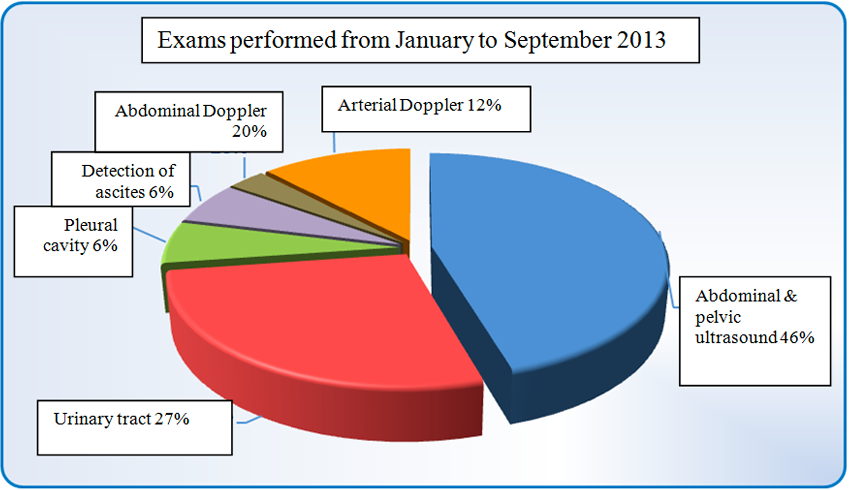Tele-expertise feedback
Tele-expertise is a form of local teleconsultation. It has been a service offered by institution since 2010. Physicians wanted to use this new technology to provide a diagnosis or to recommend additional tests.
Tele-expertise falls within the scope of the PTS (Pacte Territoire Santé) program launched by the French Minister of Health, Marisol Touraine, in December 2012 to increase access to health workers within the territory.
This initiative was possible thanks to the financial support from the regional health agency (ARS du Centre) and the technology developed by AdEchoTech through its MELODY robot.
Launched in January 14, 2013, the pilot trial is conducted only on residents of the 158-room EHPAD nursing home and patients at the 15-bed medical care and rehabilitation unit (mostly elderly patients) of the Antoine Moreau Hosptial. The new remote imaging technology fits into the bigger picture of solving the problem posed by underserved areas (« medical deserts ») and improving the ongoing care of frail, elderly patients.
This pilot is based on one of the measures and two undertakings of the PTS program:
- Measure 2: improve the working conditions of health professionals
- Undertaking 4: encourage teamwork
- Undertaking 6: expand telemedicine
1. Benefits to patients
- Access to imaging procedures where they live
- Avoid the inconvenience and complications of traveling and long wait times (increased dependency, confusion, skin irritation)
- Faster emergency examinations
- Almost instant results to provide a rapid, live diagnosis needed to recommend additional tests.
- The ability to gain access to a medical expert ensures that patients receive the appropriate treatment without needing to consider location restrictions, given the shortage of medical care also affecting the imaging field
- Improved patient care
- Access to any medical expert Dr. Arbeille stated that all medical conditions can be treated because the Tours University Hospital has specialists in all fields.
2. Benefits to doctors
- Eliminates travel, providing savings in both human and financial aspects
- Helps decision-making, and sometimes causes test ordering strategies to be revised
- Alters the inconvenience and risk/benefit ratio
- Enhances long-distance cooperations
- Allows the physician to be present during the exam and communicate with the medical expert
3. Tele-expertise organizational structure at Montoire Hospital
In partnership with the Tours University Hospital, serving as the expert site, an organizational structure was established through written procedures and flowcharts showing the different steps in the communication loop and the management of medical reports.
To make the prescribing physician’s job easier, a specific prescription was created based on the items requested by the expert site.
A patient/resident informed consent form is in place. General practitioners who prescribe ultrasounds were briefed on the established procedures during a medical board meeting. They approved of the organizational structure and written documents.
The Montoire Hospital and the Tours University Hospital decided to train nurses on how to operate the robot. Training was provided by the Tours University Hospital in collaboration with AdEchoTech.
The nurses in each unit have a pamphlet entitled « Tele-expertise » that summarizes the various procedures approved by the Montoire Hospital, the patient site.
There is also a dedicated tele-expertise appointment desk and medical report administration office.
4. Results
Over the last six months, 33 patients/residents have benefited from this new technology: 19 female and 14 male patients.




